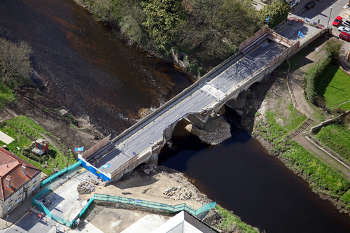More action is needed on climate change as the UK faces ‘cascading infrastructure failures’ and a rise in heat-related deaths, a major report has warned.
The Climate Change Committee (CCC), which provides independent, evidence-based advice to the Government and Parliament, has published its UK Climate Change Risk Assessment Evidence Report, which highlights risks to infrastructure and transport networks.
The CCC highlighted the ‘risks of cascading infrastructure failures across interdependent networks’, for example where bridges that carry power supplies and communications cables collapse causing a series of knock-on problems. Concerns were also raised over food and water supplies.
The number of heat-related deaths in the UK is projected to increase by around 250% by the 2050s (median estimate), due to climate change and the growing ageing population, from a current baseline of around 2,000 heat-related deaths per year.

Flood damage to a bridge in Tadcaster last winter
Lord Krebs, chairman of the Adaptation Sub-Committee of the CCC, said: ‘The impacts of climate change are becoming ever clearer, both in the United Kingdom and around the world. We must take action now to prepare for the further, inevitable changes we can expect.
‘Our independent assessment today, supported by the work of hundreds of scientists and other experts, identifies the most urgent climate change risks and opportunities which need to be addressed.’
He added: ‘Delaying or failing to take appropriate steps will increase the costs and risks for all UK nations arising from the changing climate.’
The CCC said changes to the UK climate are likely to increase the chances of droughts and floods, increasing average and extreme temperatures, and a rise in sea levels.
The report sets out five urgent risks for the UK - the two highest being flooding and coastal change to communities, businesses and infrastructure, and risks to health, wellbeing and productivity from high temperatures.
Three further areas where more action is needed are the risk of shortages in the public water supply, risks to natural capital and risks to domestic and international food production and trade.
These require ‘new, stronger or different government policies or implementation activities – over and above those already planned' which are needed 'to reduce long-term vulnerability to climate change’.
Specific risks to infrastructure include risks to transport networks from embankment failure, risks to infrastructure from river, surface/groundwater flooding and coastal flooding, and risks of sewer flooding due to heavy rainfall.
The opportunities from climate change include the possibility that UK agriculture and forestry could increase production with warmer weather and longer growing seasons, and economic opportunities for UK businesses from an increase in global demand for adaptation-related goods and services, such as engineering and insurance.
Register now for full access
Register just once to get unrestricted, real-time coverage of the issues and challenges facing UK transport and highways engineers.
Full website content includes the latest news, exclusive commentary from leading industry figures and detailed topical analysis of the highways, transportation, environment and place-shaping sectors.
Use the link below to register your details for full, free access.
Already a registered? Login